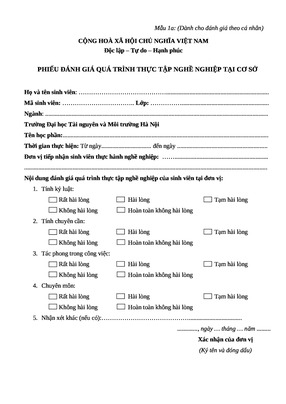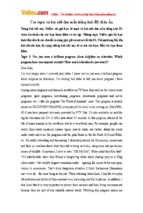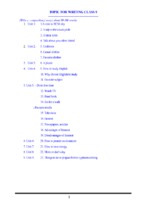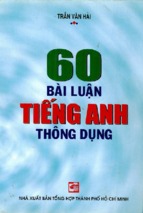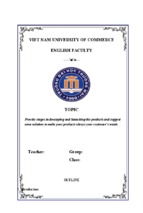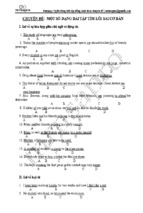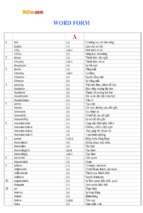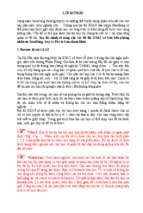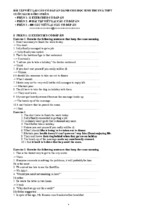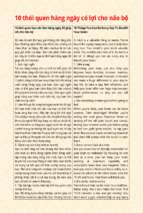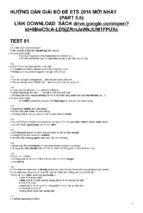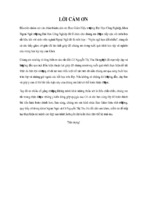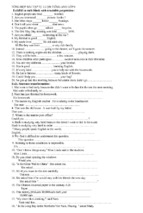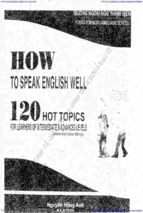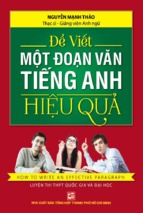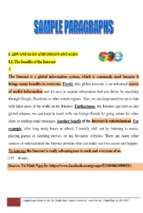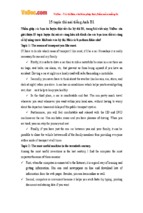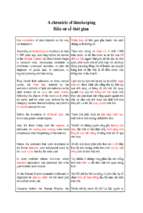ĐỀ SỐ 1
SỞ GD& ĐT NGHỆ AN
ĐỀ CHÍNH THỨC
KỲ THI TUYỂN SINH VÀO LỚP 10
TRƯỜNG THPT CHUYÊN PHAN BỘI CHÂU
NĂM HỌC 2011- 2012
Môn thi: TIẾNg ANH
SECTION I: PHONETICS
I. Choose the word whose underlined part is pronounced differently from that of the others.
1.
2.
3.
4.
5.
A. precious
A. architect
A. treason
A. aggressive
A. measure
B. preparation
B. parachute
B. reason
B. suggest
B. vision
C. pretty
C. choir
C. season
C. energy
C. pleasure
D. repetition
D. psychology
D. jealous
D. garbage
D. pension
Your answers:
1.
2.
3.
4.
5.
II. Identify the word whose stressed pattern is different from that of the others.
1.
2.
3.
4.
5.
A. official
A. diversity
A. prediction
A. valuable
A. realize
B. literacy
B. severe
B. compulsory
B. entertain
B. product
C. inventory
C. ecosystem
C. intelligent
C. honesty
C. mechanic
D. stationery
D. courageous
D. judgement
D. mountain.
D. separate
Your answers:
1.
2.
3.
4.
5.
SECTION II: VOCABULARY AND GRAMMAR
I. Choose the best answer from A, B, C or D to fill in the blanks.
1. It is recommended that he _______ this course
A. took
B. takes
C. take
D. taking
2. Various societies define _______ in many rather complex ways.
A. that is successful
B. what success is
C. that success is
D. what is success
3. I could not turn in my paper on time because my word processor _______.
A. fell down
B. turned down
C. tore down
D. broke down
4. “You must always _______ us the truth” the judge said to the man.
A. tell
B. confess
C. speak
D. say
5. Her father is a _______ drinker. He is always drinking.
A. strong
B. heavy
C. addictive
D. capable
6. Don’t set off fireworks too closely to your house, _______?
A. do you
B. don’t you
C. will you
D. won’t you
7. Trains stop here in order to _______ passengers only.
A. pick up
B. get off
C. pull up
D. pull in
8. In recent years, more and more people _______ for things with credit cards.
A. pay
B. are paid
C. are paying
D. have been paying
9. He was the first person _______ the fire.
A. discover
B. to discover
C. discovering
D. discovered
10. “Who was the man with you yesterday?” - “He was _______.”
A. the next door man
B. the man next to the door
C. the man next by the door
D. the man next door
11. John: “I didn’t pass my driving test.” -Anna: “_______!”
A. Better luck next time
B. So poor
C. Congratulations
D. That was nice of them
12. You can _______ your sister to our party tonight.
A. bring
B. carry
C. take
D. get
13. You need more exercise, so you should _______ golf.
A. carry out
B. take in
C. turn up
D. take up
14. I like that photo very much. Could you make an _______ for me?
A. increase
B. enlargement
C. expansion
D. extension
15. His roses won the first ________in the local flower competition.
A. prize
B. award
C. cup
D. reward
Your answers:
1
1.
6.
11.
2.
7.
12.
3.
8.
13.
4.
9.
14.
5.
10.
15.
II. There are TEN mistakes in the passage. Each numbered line in the right column has one.
Find and correct them.
Everyone wants to reduce pollution. But the pollution problem is as complicated as it
is serious. It is complicated because of much pollution is caused by things that
benefit people. For example, exhaust of automobiles causes a large percent of all air
pollution. However, the automobile provides transportation for million of people.
Factories discharge much of material that pollutes air and water, but factories give
employment to the large number of people.
Thus, to end or great reduce pollution immediately, people would have to stop using
many things that benefit them. Most the people do not want to do that, of course.
Nevertheless, pollution can be gradual reduced in several ways. Scientists and
engineers can work to find ways to less the way of pollution that such things like
automobiles and factories cause. Governments can pass and enforce laws that request
businesses and traffic to stop, or to cut down on certain polluting activities.
Your answer:
(1) ………..…….…
(2) ………..….……
(3) …………...……
(4) …………………
(5) …………………
(6) …………………
(7) …………………
(8) …………………
(9) …………………
(10)……………..……
III. Fill in each blank with the correct form of the given word.
1. He feels sad about his _______ result in the examination.
SATISFY
2. The_______ of this factory are widely consumed in this country.
3. You must keep on working with him no matter how much you ______.
PRODUCE
AGREE
4. Film festivals are_______ divided into categories like drama, documentary or animation.
5. He enjoyed _______ with friends and it cost nothing.
6. I have just bought a replacement for one of my favorites which _______ disappeared.
7. Gift exchange is _______ expression of social relations.
8. I try not to remember this ______ experience that only leaves me with unhappy thoughts.
9. The boy _______ asked for permission to go out with his friends.
10. British Rail apologized for the _______ of the 4.20 to Bath.
TYPICAL
SOCIAL
MYSTERY
SIGNIFY
FRIGHTEN
REPEAT
CANCEL
Your answers:
1.
2.
3.
6.
7.
8.
SECTION III: READING COMPREHENSION
4
9.
5.
10.
I. Choose the best answer from A, B, C or D to fill in each numbered blank in the following passage.
NEW HUNT FOR LIFE IN SPACE
British space scientists are planning to join the American in the race to find evidence of life on (1)_______ planets. Alan
Penny and his team at the Rutherford Appleton Laboratory have designed a telescope that is 40 times more powerful than
Hubble. Known as ‘Darwin’, his telescope could tell if planets 50 (2) _______ years away have any kind of life on them. Two
days (3) _______, NASA scientists had shown a proof that one of Jupiter’s moons could support life, Penny announced that
his telescope may be included in a European Space Agency mission. The Darwin project, with a (4)_______ of 500 million, is
on a short list of two proposals. If approved it will probably be (5)_______ around 2015, its destination somewhere between
Mars and Jupiter. The blueprint is actually for five telescopes positioned 50 meters apart in space, slowly circling a
(6)_______ processing station. The combined data from these telescopes would build up a full picture of a planet, picking out
faint images that have never been seen before. Darwin would not be able to take detailed photographs of the planets it (7)
_______, but Penny believes a second- generation telescope could be sent up to do this. He claims it is worthwhile mapping
the universe around our (8) _______ galaxy, even though these planets lie (9)_______ our reach for the moment. The European
Space Agency will make its decision (10) ______ Darwin within three years.
1.
2.
3.
4.
5.
6.
7.
8.
A. another
A. light
A. following
A. price
A. driven
A. central
A. invents
A. alone
B. other
B. lighten
B. after
B. schedule
B. fetched
B. centre
B. searches
B. same
C. others
C. lightening
C. next
C. charge
C. launched
C. middle
C. discovers
C. one
D. the other
D. lighting
D. later
D. budget
D. taken
D. heart
D. looks
D. own
2
9. A. out
10. A. of
B. toward
B. on
C. beyond
C. about
D. over
D. with
Your answers:
1.
6.
2.
7.
3.
8.
4
9.
5.
10.
II. Read the following passage and choose the best answer from A, B, C or D to the questions.
A pilot cannot fly by sight alone. In many conditions, such as flying at night and landing in dense fog, a pilot must
use radar, an alternative way of navigating. Since human eyes are not very good at determining speeds of approaching
objects, radar can show a pilot how fast nearby planes are moving. The basic principle of radar is exemplified by what
happens when one shouts in a cave. The echo of the sounds against the walls helps a person determine the size of the
cave. With radar, however, the waves are radio waves instead of sound waves. Radio waves travel at the speed of light,
about 300,000 kilometers in one second. A radar set sends out a short burst of the radio waves. Then it receives the
echoes produced when the waves bounce off objects. By determining the time it takes for the echoes to return to the
radar set, a trained technician can determine the distance between the radar set and other objects. The word “radar”, in
fact, gets its name from the term “radio detection and ranging”. “Ranging” is the term for detection of the distance
between an object and the radar set. Besides being of critical importance to pilots, radar is essential for air traffic
control, tracking ships at sea, and for tracking weather systems and storms.
1. What is the main topic of this passage?
A. The nature of radar.
B. History of radar.
C. Alternatives to radar.
D. Types of ranging.
2. According to the passage, what can radar detect besides locations of objects?
A. Shape
B. Speed
C. Size
D. Weight
3. Which type of waves does radar use?
A. tidal
B. heat
C. sound
D. radio
4. The word tracking in the passage most closely means _______.
A. sending
B. repairing C. ranging D. searching for
5. What might be inferred from the passage about radar?
A. It has improved navigational safety.
B. It was developed from a study of sound waves. C. It takes the
place of a radio.
D. It gave birth to the invention of the airplane.
Your answer:
1.
2.
3.
4.
5.
III. Fill in each numbered blank with a suitable word in the following passage.
The idea that a blind person could drive a car sounds crazy. And the concept of someone who can’t see driving a car at
almost 150 miles per hour sounds even (1) _______. Miranda Naylor, a blind accountant from Southport, has done exactly
that in an attempt to (2) _______ money for charity. Mrs. Naylor drove (3) _______ sports car for two miles in a straight line
along the runway of a disused airfield. She was in radio contact with her husband Pete Naylor, (4) _______ was able to give
her directions and advice in this way. Her amazing achievement is expected to raise about £50,000, which will be donated (5)
_______ a company that trains dogs for the blind. Mrs. Naylor has been blind (6) _______ she was six years old and she still
has some visual memories of the world (7) _______ her. She admits that not having her sight makes her life awkward at
times. She believes that if you are disabled in any way, you shouldn’t waste time (8) _______ sorry for yourself. “It makes a
lot of sense to keep busy” she says. “Achieving (9)_______ can be a great source of self confidence”. Miranda is now looking
for a new challenge and (10) _______ like to ride a motorbike.
Your answers:
1.
2.
3.
4
6.
7.
8.
9.
SECTION IV: WRITING
I. Finish the second sentence so that it has the same meaning as the first one.
5.
10.
1. I find his handwriting very hard to read.
I have …………………………………………………………………..………………………..………
2. He got down to writing a letter as soon as he returned from his work.
No sooner ………………………………………………………………………………………….…..
3. Success depends on your hard work.
The harder …………………………………………………………………………………………..…
4. “If I were you, I wouldn’t accept his marriage proposal”, said Nam to Lan.
Nam …………………………………………………………………………………………….………
5. No matter how hard I tried, I could not open the window.
3
Try ……………………………………………………………………………………..……………..….
II. Finish the second sentence so that it has the same meaning as the first one, using the given
word. Do not change the given word.
1. The fridge is completely empty.
…………………………………………………………….………………………………..…..
2. It is pointless to have that old typewriter repaired.
…………………………………………………………….……………………………..……..
3. Frank never pays any attention to my advice.
…………………………………………………………….……………………………….…..
4. John only understood very little of what the teacher said.
…………………………………………………………….……………………………..……..
5. Her ability to run a company really impresses me.
…………………………………………………………….…………………………….……..
ĐÁP ÁN BÀI THI TIẾNG ANH VÀO 10 TRƯỜNG THPT CHUYÊN PHAN BỘI CHÂU
LEFT
WORTH
NOTICE
HARDLY
IMPRESSED
SECTION I: PHONETICS
I. Choose the word whose underlined part is pronounced differently…
(5x1=5 pts)
1. C
2. B
3. D
4. A
II. Identify the word whose stressed pattern is different from …
1. A
2. C
3. D
4. B
SECTION II: VOCABULARY AND GRAMMAR
5. D
1. C
6. C
11. A
2. B
7. A
12. C
3. D
8. D
13. D
4. A
9. B
14. B
5. B
10. D
15. A
1. because
6. greatly
2. from
7. Most of
3. percentage
8. gradually
4. millions
9. lessen
5. a
10. as
1. unsatisfactory
6. mysteriously
2. products
7. significant
3. disagree
8. frightening
4. typically
9. repeatedly
5. socializing
10. cancellation
(5x1=5 pts)
5. C
I. Choose the best answer from A, B, C or D to fill in the gaps.
(15x1=15 pts)
II. There are TEN mistakes in the passage. Find them out and correct them.
III. Fill in each gap with the correct form of the given words.
SECTION III: READING COMPREHENSION
I. Choose the best answer to fill each blank in the following passage.
1. B
2. A
3. D
4. D
6. A
7. C
8. D
9. C
(10x1=10 pts)
5. C
10. B
II. Read the passage and choose the answers to the questions below.
1. A
2. B
3. C
4. D
III. Fill each blank in the following passage with a suitable word.
1. crazier
2. raise
3. a
4. who
6. since
7. around
8. feeling
9. something
SECTION IV: WRITING
I. Finish the second sentence so that it has the same meaning as the first.
5. A
(10x1=10 pts)
(10x1=10 pts)
(5x2=10 pts)
(10x1=10 pts)
5. to
10. would
(5x1=5 pts)
1. I have difficulty (in) reading his handwriting.
2. No sooner had he returned from his work than he got down to writing a letter.
3. The harder you work, the more successful you are.
4. Nam advised Lan not to accept his marriage proposal.
5. Try as hard as I might, I could not open the window.
II. Finish the second sentence so that it has ….
(5x1=5 pts)
1. There is nothing left in the fridge.
2. That old typewriter is not worth repairing. / It is not worth repairing that old typewriter.
3. Frank never takes any notice of my advice.
4. John could hardly understand what the teacher said. /Hardly could John understand……
5. What I am really impressed by is her ability to run a company. / I’m really impressed by her….
ĐỀ SỐ 2
UBND TỈNH BẮC NINH
ĐỀ THI TUYỂN SINH VÀO LỚP 10 THPT CHUYÊN
SỞ GIÁO DỤC - ĐÀO TẠO
Năm học 2009-2010
MÔN THI: Tiếng Anh (Dành cho thí sinh thi vào chuyên Anh)
Thời gian làm bài: 120 phút (không kể thời gian giao đề);
ĐỀ CHÍNH
Ngày thi: 09/07/2009
THỨC
4
A. PHONETICS (10 POINTS)
I. Choose the word (A, B, C or D) that has the underlined part pronounced differently from the others in each group.
(5 points)
1. A. climate
B. comic
C. hike
D. website
2. A. worked
B. laughed
C. hoped
D. naked
3. A. cover
B. category
C. ancient
D. decorate
4. A. erupt
B. humor
C. UFO
D. communicate
5. A. Buddhish
B. bomb
C. viable
D. bulb
II. Choose the word ( A, B, C or D) whose main stress pattern is not the same as that of the others. (5 points)
1. A. comprise
B. depend
C. design
D. novel
2. A. tropical
B. collection
C. tendency
D. charity
3. A. friendliness
B. occasion
C. pagoda
D. deposit
4. A. importing
B. specific
C . impolite
D. important
5. A. federation
B. unpolluted
C. disappearing
D. profitable
B. VOCABULARY AND GRAMMAR (35 POINTS)
I. Choose the best answer to complete each sentence. (10 points)
1. All the sentences below use “the”, which is the correct one?
A. Can you pass the sugar please?
B. The crime is a problem in many big cities.
C. The apples are good for you.
D. I love the skiing.
2. Our friends have lived in Ho Chi Minh city_______ 2002.
A. for
B. since
C. in
D. about
3. He prefers soccer______ tennis.
A. from
B. than
C. to
D. or
4. If they worked more carefully, they _____ so many mistakes.
A. won’t make B. don’t make
C. wouldn’t make
D. didn’t make
5. He _______to his friend’s party when his parents asked him to go home.
A. goes
B. was going
C. went
D. has gone
6. There’s a strange man behind us. I think ______.
A. we are followed
B. we are being followed
C. we are being following
D. we are following
7. Which of the following is the strongest advice?
A. You should get a hair- cut.
B. If I were you, I’d get a hair-cut.
C. You ought to get a hair- cut.
D. You really must get a hair- cut.
8. ________ you mind if I use your dictionary?
A. Will
B. Do
C. Can
D. Did
9. Mr. Vo Van Kiet, _______ was our former Prime Minister, was born in Vinh Long.
A. that
B. whose
C. Who
D. whom
10. All that rubbish will have to be ________ at once.
A. get rid of
B. got rid of
C. got rid
D. getting rid of
II. Give the correct form of the verbs in brackets to complete the following sentences. (10 points)
1. My friend was (make)_____ (pay)_______ back the book.
2. Hardly he (take) ________ up the book when the phone (ring) ________.
3. Can you imagine what I (come) _______ across when I (roll) ________ up the carpet yesterday?
4. If she wins the prize, it (be) __________because she (write) ______very well.
5. He resented (ask) ______ (wait) _______. He had expected the minister to see him at once.
III. Give the correct form of the word in brackets to complete each sentence. (10 points)
1. A lot of toys encourage children’s_________. (imagine)
2. The factory has provided cheaper__________ lately. (produce)
3. Burning coal is an _______ way of heating a house. Gas is much cheaper. (economy)
4. According to some scientists the earth is losing its outer atmosphere because of_____. ( pollute)
5. She has one of the biggest art________ in Britain. ( collect)
6. __________ has caused many so-called man-made disasters. (forest)
7. __________ often walk through the streets shouting or singing about something they sell. (cry)
8. Gas and oil________ always increases in cold weather. (consume)
9. The police are interested in the sudden________ of the valuable painting. (appear)
10. He claimed that his___________ had caused him to become a criminal. (bring up)
IV. Each of the following sentences has four words or phrases underlined. The four underlined parts of the sentence
are marked A, B, C, D. You are to identify the one underlined word or phrase that should be corrected or rewritten.
(5 points)
1. Preserving natural resources mean reserving them for our future.
A
B
C
D
2. Despite of the increase in air fares, most people still prefer to travel by plane.
A
B C
D
3. Regardless of your teaching method, the objective of any conversation class should be for
A
B
students to practice speaking words.
C
D
4. The injured man was taken to the hospital.
A
B
C
D
5. In order for one to achieve the desired results in this experiment, it is necessary that he work as fastly as possible.
A B
C
D
C. READING (30 POINTS)
I. The reading is followed by several questions about it. There are four possible answers (A, B, C, or D) for each
question. Choose the best answer. (15 points)
BENJAMIN FRANKLIN
Few people can embody the spirit of early America as much as Benjamin Franklin. He lived through almost the whole of
the eighteenth century, being born six years after, and dying ten years before it ended. In this time he saw the American
colonies grow from tiny settlements into a nation, and he also contributed much to the development of the new state.
5
At the age of 17 Franklin ran away to Philadelphia. He had already received some training as a printer’s apprentice, and
this helped him seven years later, with his first publication, the Pennsylvania Gazette. He also received a contract to do
government printing work, which helped him to rise from his poor background to become a successful entrepreneur.
Some of his experience in business was shared in his famous Poor Richard’s Almanak, which established his reputation
throughout the American colonies. In another of his works, the Autobiography, which was written toward the end of his
life, he shows the same quiet common sense.
He was deeply interested in science and natural history, and his experiments with electricity and lightning led directly to
the invention of the lightning rod. He was also interested in improving the conditions of his fellow men. He was involved
in a number of projects in his native Philadelphia, including the setting up of a library, a university, a philosophical
society, and–because he was a pragmatic man–a fire prevention service. In 1753 he became Postmaster–General of
the colonies. Through this experience he began to develop the idea that the colonies of North America should be a single
nation. Later, he went to London to try to persuade the British government to change the conditions, especially the taxes,
that later led the American colonists into rebellion.
Whatever Benjamin Franklin’s personal feelings about the rebellion of the American states, he worked hard to make it
succeed. As ambassador to France, he encouraged the French to help George Washington. After the war he attended the
American constitutional congress. This was his last contribution, for he died later that year. He is still fondly
remembered by Americans as one of the creators of the United States.
1. What is a good description for this text?
A. An autobiography of Benjamin Franklin. B. The life of Benjamin Franklin.
C. The works of Benjamin Franklin.
D. Franklin and American Independence.
2. When was Benjamin Franklin born?
A. 1806
B. 1794
C. 1717
D. 1706
3. Which of these happened first?
A. Franklin trains as a painter.
B. Franklin runs away to Philadelphia.
C. the American colonies rebel
D. Franklin starts his first publication.
4. What was Poor Richard’s Almanak about?
A. Franklin’s reputation.
B. How to succeed in business.
C. how to do government printing.
D. The text does not say.
5. In which countries did Franklin live?
A. England and France.
B. Philadelphia and England.
C. London and America.
D. England, America and France.
II. Read the text below and think of the word which best fits each space. Use only one word in each space. There is
an example at the beginning (0). (15 points)
SAVING THE TIGER.
In 1973, when the tiger appeared to (0) be facing extinction, the World Wide Fund for nature and __(1)____ Indian
Government agreed to set ___(2)__ “Operation Tiger” – a campaign __(3)___ save this threatened creature. They
started by creating nine special parks ___ (4) ___ that tigers could live in safety. The first was at Ramthambhore , a
region ___(5)__ was quickly turning into a desert __(6)__ too much of the grass was being eaten by the local people’s
cattle. At the time there ____(7)__ just fourteen tigers left there. The government had to clear twelve small villages,
which means moving nearly 1,000 people and 10,000 cattle so the land __ (8) __ be handed back to nature.
Today, Ramthambhore is a very different place, with grass tall ___(9)___ for tigers to hide in, and There are now at
_(10)___ forty of them __(11)__ the park, wandering freely about. Other animals have also benefited. For example, there
are many ___(12)____ deer and monkeys than before. The people __(13)__ were moved are now living in better
conditions. They live in new villages away __(14)___ the tiger park, with schools, temples and fresh water supplies.
There are now sixteen such tiger parks in India and the animals’ future looks ___ (15)____ little safer.
D. WRITING (25 POINTS)
I. Complete the second sentence so that it has a similar meaning to the sentence printed before it, begin with the
given word(s) or phrase. (20 points)
1. You should review your lessons for the exam.
It’s time____________________________________________________________
2.That man used to work with me when I lived in New York.
That’s ____________________________________________________________
3.What a pity they close the shops at lunch- time.
I wished ____________________________________________________________
4. We like ice- cream but we don’t have it every day.
Although ___________________________________________________________
5.When did you start working in that factory?
How long ___________________________________________________________
6. Oil was slowly covering the sand of the beach.
The sand ___________________________________________________________
7. “ Where’ s the station car- park?” Mrs. Smith asked.
Mrs. Smith asked ____________________________________________________
8. He was sorry he hadn’t said goodbye to her at the airport.
He regretted _________________________________________________________
9. I advise you not to buy that car.
If _________________________________________________________________
10. Why don’t you ask her yourself?
I suggest that _______________________________________________________
II. Make full sentences based on given cues. (5 points)
1. If you/ not go/ the party/ I / go/ either.
2. Unless/ I/ have/ quiet room/ I/ not/ able/ do/ work.
3. nurse/ kind enough/ help him/ walk.
4. He/ rather spend/ holidays/ a farm/ seaside.
5. I/ return/ visit/ Japan. It/ wonderful trip.
THE END
ĐÁP ÁN CHUYÊN 10 (2009-2010)
A. PHONETICS(10pts)
6
I. Choose the word in each that has the underlined part pronounced differently from the others in each group.(5pts) (
mỗi câu viết đúng được 1đ)
1. B
2. D
3. C
4. A
5. B
II. Choose the word whose main stress pattern is not the same as that of the others.(5pts)
( mỗi câu viết đúng được 1đ)
1. D
2. B
3. A
4. C
5. D
B. VOCABULARY AND GRAMMAR(35pts)
I.
1. A
2. B
3. C
4. C
5. B
6. B
7. D
8. B
9. C
10. B
Choose
the best
answer to complete each sentence.(10pt)s( mỗi câu viết đúng được 1đ)
II. Give the correct form of the verbs in brackets to complete the following sentences. (10pts)
(( mỗi câu viết đúng được 1đ)
1. made - to pay
3. came – was rolling
2. had he taken – rang
4. will be – writes
5. being asked – to wait
III. Give the correct form of the word in brackets to complete each sentence.(10pts)
( mỗi câu viết đúng được 1đ, nếu viết đượcc từ nhưng thiếu “s” thì từ đó vẫn không
được tính điểm)
1. imagination
2. products
3. uneconomical
uneconomic
4. pollution
5. collections
6. Deforestation
7. Criers
8. consumption
9. disappearance
re - appearance
10. upbringing
IV. Each of the following sentences has four words or phrases underlined. The four underlined parts of the sentence
are marked A, B, C, D. You are to identify the one underlined word or phrase that should be corrected or
rewritten.(5pt) (mỗi câu viết đúng được 1đ)
1. B
2. A
C. READING (30PTS)
3. D
4. D
5. C
I. The reading is followed by several questions about it. There are four possible answers (A, B,
C, or D) for each question. Choose the best answer.(15pts) ( mỗi câu viết đúng được 3đ)
1. B
II. Read
2. D
3. A
4. B
5. D
the text below and think of the word which best fits each space. Use only one word in
each space. There is an example at the beginning (0) (15pts) (( mỗi câu viết đúng được 1đ)
1. the
2. up
3. to
4.so
5. that/which
6. since/as/ because/for
7. were
8. might/could
9. enough
10. least
11. in
12. more
13. who/ that
14. from
15. a
C. WRITING (25pts)
I. Complete the second sentence so that it has a similar meaning to the sentence printed before it, begin with the
given word(s) or phrase.(20pts( mỗi câu viết đúng được 2đ)
1. (It’s time) you reviewed your lessons for the exam.
2. (That’s) the man who used to work with me when I lived in New York.
3. (I wish) they would open the shops at lunch time/ Or. (I wished) they wouldn’t close the shops at lunch
time.
4. (Although) we like ice- cream, we don’t have it everyday.
5. (How long) have you been working in that factory?
6. ( The sand) of the beach was being slowly covered by oil.
7. ( Mrs. Smith asked) (me) where the station car-park was.
8. (He regretted) not saying/ having said goodbye to her at the airport.
9. (If I) were you, I wouldn’t by that car.
10. (I suggest that) you (should) ask her yourself.
II. Make full sentences based on given cues. (5 points) ( mỗi câu viết đúng được 1đ)
1. If you don’t go to the party, I won’t go either.
2. Unless I have a quiet room, I will not/ won’t be able to do my homework/ any work.
3. The nurse is /was kind enough to help him (to) walk.
4. He would rather spend his holidays on a farm than at the seaside.
5. I have (just) returned from a visit to Japan. It was a wonderful trip.
Tổng số điểm 100.
Sau khi chấm giám khảo quy về thang điểm 10.
Cách làm tròn điểm; ( ví dụ)
7,1 7,0
7
7,2; 7,3
7,4; 7,6
7,7; 7,8
7,9
7,25
7,5
7,75
8,0
ĐỀ SỐ 3
UBND tØnh vòng tµu
Së Gi¸o dôc - §µo T¹o
Kú thi tuyÓn sinh vµo líp 10 thpt chuyªn
N¨m häc 2009 - 2010
M«n thi: TiÕng Anh 9 (Cho thÝ sinh thi vµo chuyªn Anh)
Thêi gian: 120 phót ( kh«ng kÓ thêi gian giao ®Ò )
Ngµy thi: 25/ 6/ 2009
§Ò chÝnh thøc
A. pronunciation (10 points).
I. Choose the word (A, B, C or D) that has the underlined part pronunced differently from the
others in each group. (5 points)
1. A. author
B. other
C. there
D. they
2. A. forest
B. control
C. product
D. ecology
3. A. industry
B. translate
C. construction
D. satisfy
4. A. baggage
B. courage
C. damage
D. invasion
5. A. advantage
B. addition
C. advertise
D. adventure
II. Choose the word (A, B, C or D) whose main stress pattern is not the same as that of the
others. (5 points)
1. A. deposit
B. festival
C. institute
2. A. surprising
B. astonishing
C. amazing
3. A. interview
B. industry
C. essential
4. A. extreme
B. generous
C. lonely
5. A. friendly
B. extra
C. along
B. VOCABULARY AND GRAMMAR (40 points).
I. Choose the best answers to completes each sentence. (10 points)
D. resident
D. interesting
D. difficult
D. clothing
D. orphanage
1. One problem for teacher is that each student has his/ her own ________ needs.
A. separate
B. divided
C. individual
D. distinctive
B. distracted
C. gripped
D. engrossed
A. right
B. in time
C. on time
D. before time
A. certificate
B. licence
C. paper
D. card
A. about
B. down
C. aside
D. in
A. At all costs
B. By all means
C. In all
D. On the whole
A. came round
B. came about
C. came down
D. came away
A. are given
B. is given
C. were given
D. give
A. turned in
B. turned over
C. turned up
D. turned round
2. I was ________ in the book I was reading and didn’t hear the phone.
A. submerged
3. If we hurry, we might get there ________ to catch the early train.
4. To get a passport, you must send in your birth ________ and two photos.
5. She tries to set ________ an hour a week for practice.
6. ________ stay the night if it’s too difficult to get home.
7. Robert and his wife ________ to my house for tea yesterday evening.
8. Each of the guests ________ a bunch of flowers.
9. To everyone’s surprise, Mr Brown ________ at the Trade Union meeting.
10. Everyone burst out laughing. There was a lot of ________.
A. laughs
B. laughter
C. laughings
D. laugh
II. Give the correct form of the verbs in brackets. (10 points)
1. I (meet) ________ John before I (be) ________ a fortnight in Paris.
2. The children were frightened because the lights suddenly (go) ________ out and they (sit) ________ in the dark.
3. What tune (play) ________ when we (come) ________ in?
4. She was badly hurt when her car hit another car. If she (wear) ________ her seat belt, she (not hurt) ________ so
badly.
5. Coming into the room he (see) ________ Mary where he (leave) ________ her.
III. Give the correct form of the verbs to complete the passage. (10 points)
1. We go to the restaurant for ________ whenever we ‘re tired of eating meat. (vegestable)
2. Don’t worry. I ‘ll be waiting for you at the ________ to the pagoda . (enter)
3. The old theater of our city is being enlarged and ________. (modern)
4. Advertisements acount for three fourths of the ________ of the newspaper. (come)
5. What is the ________ of the adjective “solid”. ( oppose)
6. ________ should complain if they are not satisfied with the service they recieve. (Consume)
7. If your work is ________ you won’t get a raise. (satisfy)
8. ________ are alarmed by the rate at which tropical rainforest are being destroyed.(Conserve)
9. The athletes take part in the Olympic Games in the true spirit of ________. (sport)
10. You can never be sure what he is going to do. He is so ________. (predict)
IV. Arrange these sentences to make a complete passage (10 points).
8
a.
b.
c.
d.
e.
As they built bigger and bigger ships, they were able to sail further and further away.
They don’t really mean that the world is getting smaller, of course.
They found that as they sailed further away from their home countries, the world became bigger.
Then men began to use ships to explore the world.
Today there are no undiscovered countries left to put on the map, but there are many new worlds to discover out in
space.
f. But 2,300 years ago the Egyptians and the Greek thought that the world was very small and flat that around it was
the ocean.
g. We often hear people saying that the world is getting smaller.
h. So they had to make new maps to show the countries that they found.
i. And they discovered new countries that they didn’t know about.
j. What they mean is that with modern means of transport, we can now reach every part of the world very quickly.
C. READING (30 points).
I. Read the passage below and choose the best answer for each question. (5 points)
People have been playing with marbles for thousands of years. The first marbles were probably either river stones
that happened to be naturally round enough to roll or, more likely, rounded globs of clay that were baked hardness. Such
very old clay marbles have been found in both Greek and Roman ruins, and quartz spheres have been dated at around
6000 B.C. Harder and more durable marbles tend to inspire different kinds of games than soft clay marbles, which crack
very easily. So with the advent of hand rounded and polished marbles made of agate or some other rugged, igneous rock,
the ‘golden age’ of marbles and marble play flowered. Stone marbles began to appear in the early 1800s in what is now
the southern part of Germany. Shortly after, handmade glass marbles appeared in the same part of Europe. For the next
120 years, marbles and marble playing-there were literally hundred of games - flourished in both Europe and America.
Marble players developed their own vocabulary for different sizes and materials of marbles, as well as for the many
kinds of games to be played and the way marbles were used in the games. For example, if you were going to play a game
of Ring-Taw, one of the most popular and enduring marbles games, you would lag for the first shot, and then knuckle
down from the baulk, trying your best to get a mib or two with your opponent’s immie.
1. The author makes the point in the passage that playing with marbles __________.
A. has been going on since ancient times
B. is a relatively recent phenomenon
C. is losing popularity
D. is a very expensive pastime
A. agate
C. rock
2. According to the passage, which of the following was the least used substance for making
marbles?
B. glass
D. clay
3. It can be inferred from the passage that the use of marbles became very popular in Europe
and America __________.
A. in the 18th century
B. in the 1970s
C. in 6000 B.C
D. after glass marbles were developed
A. is a game only for children
B. has many variations in games
C. is played according to one set of rules
D. uses only one kind of marble
4. We can infer from the passage that marble playing __________.
5. We can conclude from lines 11-12 of the passage that the terminology of marble playing is
__________.
A. specialized
C. easy to understand
B. used only by children
D. derived from an ancient language
II. Read the text and decide which answer (A, B, C or D) best fits each space. (15 points)
Look on the bright side
Do you ever wish you were more optimistic, some one who always (1) _______ to be successful? Having some one
around who always (2) _______ the worst isn’t really a lot of (3) _______ we all know someone who sees a single cloud
on a sunny day and says,b “It looks (4) _______ rain.” But if you catch yourself thinking such things, it’s important to
do something (5) _______ it. You can change your view of life, (6) _______ to psychologists, it only takes a little effort,
and you’ll find life more rewarding as a (7) _______ . Optimism, they say, is partly about self-respect and confidence,
but it’s also a more positive way of looking at life and all it has to (8) _______ . Optimists are more (9) _______ to start
new projects and generally more prepared to take risks.
Upbringing is obviously very important in forming your (10) _______ to the
world. Some people are brought up to (11) _______ too much on others and grow up
forever blaming other people when anything (12) _______ wrong. Most optimists,
on the (13) _______ hand, have been brought up not to (14) _______ failure as the end
of the world-they just (15) _______ with their lives.
1. A. counted
B. expected
C. felt
D. waited
2. A. worries
B. cares
C. fears
D. doubts
3. A. musement
B. play
C. enjoyment
D. fun
4. A. so
B. to
C. for
D. like
5. A. with
B. against
C. about
D. over
6. A. judging
B. according
C. concerning
D. following
7. A. result
B. reason
C. purpose
D. product
8. A. supply
B. suggest
C. offer
D. propose
9. A. possible
B. likely
C. hopeful
D. welcome
10. A. opinion
B. attitude
C. view
D. position
11. A. trust
B. believe
C. depend
D. hope
12. A. goes
B. falls
C. comes
D. turns
13. A. opposite
B. next
C. other
D. far
14. A. regard
B. respect
C. suppose
D. think
15. A. get up
B. get on
C. get out
D. get over
III. Fill in each blank with one suitable word to complete this passage. (10 points)
Travelling to all corners of the world is (1) _______ easier and easier. We live (2) _______ a global village, but how
well do we know and understand each other ? Here is (3) _______ simple test. Imagine you have arranged a meeting at
4 p.m . What time should you expect your foreign business colleagues to arrive? If they are German, they ‘ll be exactly
(4) _______ time. If they are American, they ‘ll probably be 15 minutes early. If they are Bristish, they be 15 minutes (5)
_______, and you should allow up to an hour for the Indians. Therefore, these are some small advice in (6) _______ not
9
to behave badly abroad. In France you shouldn’t sit down in a cafard untill you are shaken hands with everyone you
know.In Afghanistan you ‘d better spend at last 5 minutes (7) _______ hello. In Pakistan you mustn’t wink. It is
offensive. In the Middle East you must never use the left hand for greeting, eating, drinking or smoking. Also, you
should care not to admire (8) _______ in your host’s home. They will feel that they have to give it to you.In Russia you
must your hosts drink for drink or they will think you are unfriendly. In Thailand you should clasp your hands (9)
_______ and lower your head and your eyes when you greet someone. In America you should eat your hamburger with
both hands and as quickly as (10) _______. You shouldn’t try to have a conversation until it is eaten.
D. WRITING (20 points).
I. Rewrite the sentences in such a way that they mean almost the same as those printed before them. (10 points)
1. My brother studies now harder than he used to.
My brother .............................................................................................................................
2. Please don’t ask me that question.
I’d rather ................................................................................................................................
3. I last saw Bob when I was in Ho Chi Minh City.
I haven’t .................................................................................................................................
4. John only understood very little what the teacher said.
John could hardly ..................................................................................................................
5. Tom will be twenty next week.
It’s Tom’s ..............................................................................................................................
6. She is fond of her nephew although he behaves terribly.
She is fond of her nephew in .................................................................................................
7. He prefers reading books to watching TV.
He would ...............................................................................................................................
8. He didn’t hurry, so he missed the bus.
If ............................................................................................................................................
9. The train takes longer than the plane.
The plane ...............................................................................................................................
10. I don’t suppose you have change for 2 pounds, do you?
Do you happen .......................................................................................................................
II. Use the promps provided to write full sentences to make a complete letter. (10 points)
Dear Sir / Madam,
1. I / like / express / concern / increasing number / karaoke bars / city.
2. There be / lot / reason / I object / places.
3. Firstly, / owners / take / much money / those / come / sing.
4. Secondly, / they cause / much noise / neighborhood.
5. Thirdly, / there / number / pupils / play truant / just / go / those places / sing.
6. Last / least / these bars / do harm / appearance / city / because / their / ugly flashing lights.
7. I want / say / I / not / old fashioned person.
8. I hope / authority / take / matter / careful consideration.
9. I / not mean / ban them / but / there should / effective way / control / this kind / entertainment places.
10. I / look / see / city council / do / this master.
Yours truly, Thomas Cruise.
---------- The end ---------(§Ò thi nµy cã 04 trang)
Hä vµ tªn thÝ sinh: ................................................................................... Sè b¸o danh: ...................
10
UBND tØnh vòng tµu
Së gi¸o dôc - ®µo t¹o
®¸p ¸n ®Ò thi tuyÓn sinh vµo líp 10 thpt chuyªn
N¨m häc 2009 - 2010
M«n thi : TiÕng Anh
Thêi gian: 120 phót ( kh«ng kÓ thêi gian giao ®Ò )
§Ò chÝnh thøc
Ngµy thi: 25/ 6/ 2009
pronunciation (10 points).
A.
I. Choose the word (A, B, C or D) that has the underlined part pronunced differently from the
others in each group. (5 points) - 1/ each.
1. A
2. B
3. B
4. D
5. C
1. A
2. D
3. C
B. VOCABULARY AND GRAMMAR (35 points).
4. A
5. C
1. C
6. B
4. A
9. C
II. Choose the word (A, B, C or D) whose main stress pattern is not the same as that of the
others. (5 points) - 1/ each.
I. Choose the best answers to completes each sentence (10 points) - 1/ each.
2. D
7. A
3. B
8. B
II. Give the correct form of the verbs in brackets (10 points) - 1/ each.
1. met – had been.
2. had gone – were sitting.
3. was being played – came.
5. C
10. B
4. had been wearing – wouldn’t have been hurt.
5. saw – had left.
III. Give the correct form of the verbs to complete the passage (10 points) - 1/ each.
1. vegetarians
6. consumers
2. entrance
7. untisfactory
3. modernized
8. Conservationists
4. incomes
9. sportsmanship
5. opposite
10.unpredictable
IV. Arrange these sentences to make a complete passage (10 points).
gbj f dci a h e.
C. READING (30 points).
I. Read the passage and choose the best answer to each question (5 points) - 1/ each.
1. A
2. D
3. D
4. B
5. A
II. Read the text and decide which answer best fits each space (15 points) - 1/ each.
1. B
2. C
3. D
4. D
5. C
6. B
7. A
8. C
9. B
10. B
11. C
12. A
13. C
14. A
15. B
II. Fill in each blank with one suitable word to complete this passage (10 points) - 1/ each.
1. getting
2. in
3. a
4. on
5. late
6. order
7. saying
8. anything
9. togethet
10. possible
D. WRITING (20 points).
I. Rewrite the sentences in such a way that they mean almost the same as those printed before them. (10 points)
1. My brother didn't use to study as/ so hard as he does now/ used to study more lazily than he does now.
2. I’d rather you didn’t ask me that question.
3. I haven’t seen Bob since I was in Ho Chi Minh City.
4. John could hardly understand what the teacher said.
5. It's Tom's twentieth birthday next week.
6. She is fond of her nephew in spite of his terrible behaviour.
7. He would rather read books than watch TV.
8. If he had hurried he would/could have caught / wouldn’t have missed the bus
9. The plane does not take as long as/takes a shorter time than/ is quicker/faster than the train.
10. Do you happen to have change for 2 pounds?
II. Use the promps provided to write full sentences to make a complete … (10 points) - 1/ each.
Dear Sir/ Madam,
1. I would like to express (my) concern about the increasing number of karaoke bars in the/ our city.
2. There are a lot of reasons that/ why I object to these/ those places.
3. Firstly, the owners take too much money from those people who come to sing.
4. Secondly, they cause/ are causing too much noise in/ to the neighborhood.
5. Thirdly, there are a number of pupils who/ that play truant just to go to those places to sing.
6. Last but not least, these bars do harm to the appearance of the city because of their ugly flashing light.
7. I (also) want to say (that) I am not an old fashioned person.
8. I hope (that) the authority will take this matter into careful consideration.
9. I do not mean to ban them, but there should be an/ some effective way to control this kind of entertainment places.
10. I look/ am looking forward to seeing the city council doing something about this matter.
Yours truly, Thomas Cruise.
Tæng ®iÓm bµi thi : Tæng sè c©u ®óng/ 10.
---------- The end ----------
11
ĐỀ SỐ 4
UBND tØnh phó yªn
Së Gi¸o dôc - §µo T¹o
§Ò chÝnh thøc
Kú thi tuyÓn sinh vµo líp 10 thpt chuyªn
N¨m häc 2009 - 2010
M«n thi: TiÕng Anh 9 (Cho thÝ sinh thi vµo chuyªn Anh)
Thêi gian: 120 phót ( kh«ng kÓ thêi gian giao ®Ò )
A. pronunciation (10 points).
I. Choose the word (A, B, C or D) that has the underlined part pronunced differently from the
others in each group. (5 points)
1. A. clerk
B. terse
C. term
D. jerk
2. A. mouths
B. paths
C. months
D. wreaths
3. A. vehicle
B. rhythm
C. exhume
D. behold
4. A. dormitory
B. information
C. organization
D. forward
5. A. food
B. shoot
C. shook
D. spool
II. Choose the word (A, B, C or D) whose main stress pattern is not the same as that of the
others. (5 points)
1. A. philosopher
B. patriot
C. atmosphere
D. habit
2. A. pollute
3. A. economical
B. severe
B. personality
C. tragic
C. preparatory
D. humane
D. entertaiment
4. A. interrupt
5. A. mechanic
B. interview
B. terrific
C. intervene
C. Arabic
D. interstellar
D. Pacific
12
B. VOCABULARY AND GRAMMAR (40 points).
I. Choose the best answers to completes each sentence. (10 points)
1. I am afraid that these regulations have to be __________ with.
A. complied
B. provided
C. faced
D. met
A. up
B. on
C. in
D. over
A. search
B. be in search
C. look after
D. look for
A. accurate
B. punctural
C. efficient
D. reliable
A. near to
B. ready for
C. on the way
D. about to
A. searched
B. investigated
C. vetted
D. scrutinized
A. Most
B. Almost
C. Each
D. Nearby
A. other
B. expect
C. rather
D. apart
A. blue
B. green
C. yellow
D. white
2. His business is growing so fast that he must take __________ more workers.
3. The police must now __________ the escaped convict in the surrounding countries.
4. You are late again, please try to be __________ in the future.
5. Edward has found a bigger flat and is __________ move into it.
6. All the applicants for the post are thoroughly __________ for their suitability.
7. __________ every part of the world has experienced an earthquake in recent years.
8. He didn’t know anyone at the wedding __________ than the bridge and groom.
9. When Bill saw my new car, he was __________ with envy.
10. He was holding a tiny bird in the __________ of his hand.
A. thumb
B. hole
C. shin
D. palm
II. Give the correct form of the verbs in brackets. (10 points)
1. The man at the corner table (glance) _______ my way to see if I (listen) _______.
2. When I (look) _______ at my suitcase, I could see that somebody (try) ______ to open it.
3. I don’t know what’s the matter with him. He (act) _______ funny since you (be) _______ away.
4. Scarcely they (move) _______ into the new house when their friends (come) _______ in.
5. Just as I (wonder) what to do next, the phone (ring) _______.
III. Give the correct form of the verbs to complete the passage. (10 points)
1. In some areas water has to be boiled to ________ it. (pure)
2. He examined the parcel ________, as he had no idea what it could be. (suspect)
3. How do you ________ the real painting from the fake one ? (different)
4. Don’t worry about the volcano. It’s been ________ for years. (act)
5. Leisure habits won’t change much in the ________ future. (see)
6. The conditions in the man’s prison were ________. (human)
7. I object strongly to the ________ of sport. (commerce)
8. A list of ________ events for the autumn is being prepared. (come)
9. Most people who work feel that they are ________. (pay)
10. They frequently ________ the traffic as they march through the streets. (mobile)
IV. Fill in each blank with a suitable prepostion. (10 points)
1. If she takes __________ the job of director, she will have to work harder.
2. The government put __________ the rebellion with great severity.
3. There was a man giving __________ leaflets outside the church.
4. I can’t make __________ the postmark on the letter, it looks like Basing stoke.
5. If he refuses to fall __________ my phans I can probably find someone more co-operative.
6. Diana showed a complete disregard __________ her own safety.
7. We walked on tiptoe __________ fear of being discovered.
8. Mary broke down __________ tears when we told her about the accident.
9. The car pulled __________ beside me and the driver asked me the way to the post office.
10. I had to send __________ an electrician to mend the switch.
C. READING (30 points).
I. Read the passage below and choose the best answer for each question. (5 points)
Man is a land animal, but he is also closely tied to the sea. Throughout history the sea has served the need of man. The
sea has provided man with food and a convenient way to travel to many parts of the world. Today, nearly two thirds of the
world’s population live within 80 kms of the sea coast.
In the modern technological world, the sea offers many resources to help mankind survive. Resources on land are
beginning to be used up. The sea, however, still can be hoped to supply many of man’s needs. The list of riches of the sea yet
to be developed by man’s technology is impressive. Oil and gas explorations have been carried out for nearly 30 years. A lot
of valuable minerals exist on the ocean floor ready to be mined.
Fish farming promises to be a good way to produce large quantities of food. The culture of fish and shellfish is an
ancient skill practised in the past mainly by Oriental people.
Besides oil and gas, the sea may offer new sources of energy. Experts believe that the warm temperature of the ocean
can be used in a way similar to the steam in a steamship. Ocean currents and waves offer possible use as a source of energy.
Technology is enabling man to explore ever more deeply under the sea. The development of strong, new materials has
made this possible.
The technology to harvest the sea continues to improve. Experts believe that by the year 2050s the problems that prevent
us from fully exploiting the food, minerals, and energy sources of the sea will be largely solved.
1. The best title for this passage is ___________.
A. Sea Harvest.
C. Sea Food.
B. Technology and the Exploiting of the Sea.
D. Man and Sea.
A. food, energy sources and minerals.
C. minerals and oil.
B. fish and oil.
D. ocean currents and waves.
A. it provides man with sea food.
C. it supplies man with minerals.
B. it offers oil to man.
D. all of the above.
2. The major things that the sea offers man are ___________.
3. The sea serves the needs of man because ___________.
13
4. The word Oriental people in the fourth paragraph probably means ___________.
A. European people.
B. African people.
C. Asian people.
D. American people.
5. We can conclude from the passage that ___________.
A. the sea resources have largely been used up.
B. the sea, in a broad sense, hasn’t yet been developed.
C. the problems that prevent us from fully exploiting the sea have already been solved.
D. by the year 2050, the technology will be good enough to exploit all the sea resources.
II. Read the text and decide which answer (A, B, C or D) best fits each space. (15 points)
street papers
The problem of homelessness is an international one. In the capital cities of the world, the (1) _______ of people begging
on the streets is becoming increasingly (2) _______. But all over the world, homeless people are taking the future into their
own (3) _______. By selling “street papers” they no longer need to beg for a (4) _______.
The concept of the street paper is (5) _______. It is sold by homeless and ex-homeless people who buy it at a (6) _______
price of 30 p and sell it to the public for 70 p, keeping 40 p for themselves. If they have no money, then they can get the first
ten copies on (7) _______ and pay for them later. Every paper seller receives training and is given a special (8) _______
badge.
The paper itself (9) _______ articles of general and social interest, film and book (10) _______, cartoons and the (11)
_______ celebrity interview. Advertising and sales (12) _______ most of the income, and all profits go (13) _______ into
helping homeless people.
The Big Issue is the street paper of the British homeless. It was set up in 1991 and (14) _______
then it has helped hundreds of people to get (15) _______ the streets and back into society.
1. A. sight
B. vision
C. look
D. view
2. A. usual
B. common
C. rare
D. routine
3. A. heads
B. shoulders
C. hands
D. mouths
4. A. life
B. living
C. being
D. pay
5. A. easy
B. straight
C. plain
D .simple
6. A. stuck
B. steady
C. held
D. fixed
7. A. credit
B. cheque
C. cash
D. card
8. A. character
B. personality
C. manner
D. identity
9. A. consists
B. contains
C. keeps
D. gets
10. A. stories
B. reviews
C. opinions
D. views
11. A. sometimes
B. often
C. occasional
D. seldom
12. A. give
B. provide
C. show
D. offer
13. A. back
B. out
C. through
D. forward
14. A. from
B. of
C. for
D. since
15. A. out
B. away
C. off
D. up
III. Fill in each blank with one suitable word to complete this passage. (10 points)
ADVICE TO YOUNG PEOPLE ABOUT TO START WORK
In these days of high unemployment, it is often difficult (1) __________ young people to find a job. If they are lucky (2)
__________ to be asked to go for an interview, they may find (3) __________ there are at least 20 other applicants for the
(4) __________. If a company is thinking of offering (5) __________ a job, they will ask you for at least one reference from
either your previous employer (6) __________ someone who knows you well. (7) __________ taking up your job, you may
have to sign a contract. You will probably have to do some training, (8) __________ help you to do the job more
successfully. Once you have decided that this is your chosen career, you will then have to work (9) __________ to try and
get promotion, which usually brings more responsibility and more money! If you are unlucky, you may be made redundant,
and not be able to find (10) __________ job. It is also a good idea to pay some money
into a pension scheme, which will help you to look after yourself and your family when you are retired. Finally, good luck!
D. WRITING (20 points).
I. Rewrite the sentences using the words in bold, in such a way that it means the same as the one given. Do not alter
these words in any way. (10 points)
1. They’re telling me that I must make a decision soon. (pressure)
…………………………………………………………………………………………………
2. His smooth manner didn’t deceive us. (taken)
…………………………………………………………………………………………………
3. I really must answer all these letters. (get down)
…………………………………………………………………………………………………
4. Don’t run away with the idea that this work is easy. (conclusion)
…………………………………………………………………………………………………
5. I’m trying to concentrate, but all that noise you’re making is distracting me. (putting)
…………………………………………………………………………………………………
6. Nobody expected her to lose, but she did. (against)
…………………………………………………………………………………………………
7. You must concentrate on your work more. (apply)
…………………………………………………………………………………………………
8. She will probably be elected. (stands)
…………………………………………………………………………………………………
9. The boss was annoyed because his secretary came to work late. (objected)
…………………………………………………………………………………………………
10. The demand for tickets was so great that people queued day and night. (such)
…………………………………………………………………………………………………
14
II. Use the promps provided to write full sentences to make a complete letter. (10 points)
Dear John,
1. last letter / you / kindly offer / put / me / your flat / I be / Berlin.
2. I/ be / afraid / I / unable / take / offer / time being.
3. My father / sick / I / to stay / home / care / him.
4. He / very sick / I cannot / him / alone.
5. My brother / also / help / look / Dad / but / he now / away / business trip / Paris.
6. I / hope / be able / come / Berlin / later / end / year, / perhaps / January.
7. If / room / free / I / glad / stay / you.
8. I / let / know / phan / soon / possible / order / not interfere / own plan.
9. Thank / much / again / offer.
10. I / not / wait / see / you / Berlin / but / then / goodbye.
With love,
Maria
15
A. pronunciation (10 points).
I. Choose the word (A, B, C or D) that has the underlined part pronunced differently from the
others in each group. (5 points) - 1/ each.
1. A
2. C
3. C
4. B
5. A
1. A
2. C
3. C
B. VOCABULARY AND GRAMMAR (35 points).
4. B
5. C
1. A
6. C
4. B
9. B
II. Choose the word (A, B, C or D) whose main stress pattern is not the same as that of the
others. (5 points) - 1/ each.
I. Choose the best answers to completes each sentence (10 points) - 1/ each.
2. B
7. B
3. B
8. A
II. Give the correct form of the verbs in brackets (10 points) - 1/ each.
1. glanced – was listening.
2. looked – had tried.
3. has been acting – have been.
5. D
10. D
4. had they moved – came.
5. was wondering – rang.
III. Give the correct form of the verbs to complete the passage (10 points) - 1/ each.
1.
2.
3.
4.
5.
purify
suspiciously
differentiate
inactive
foreseeable
6.
7.
8.
9.
10.
inhuman
commercialization
forthcoming
underpaid
immobilise/ immobilize
IV. Fill in each blank with a suitable prepostion (5 points) - 1/ each.
1. on/ over
2. down
6. for
7. for
C. READING (30 points).
3. out
8. in
4. out
9. up
5. in with
10. for
I. Read the passage and choose the best answer to each question (5 points) - 1/ each.
1. B
2. A
3. D
4. C
5. D
II. Read the text and decide which answer best fits each space (15 points) - 1/ each.
1. A
2. B
3. C
4. B
5. D
6. D
7. A
8. D
9. B
10. B
11. C
12. B
13. A
14. D
15. C
II. Fill in each blank with one suitable word to complete this passage (10 points) - 1/ each.
1. for
2. enough
3. that
4. job
5. you
6. or
7. Before
8. which
9. hard
10. another
IV. WRITING (20 points).
I. Rewrite the sentences using the words in bold, in such a way that it means the same as the one given. Do not alter
these words in any way. (10 points) - 1/ each.
1. They are putting pressure on me to make a decision soon.
2. We were not taken in by his smooth manner.
3. I really must get down to answerring all these letters.
4. Don’t come to/ draw the conclusion that this work is easy.
5. I’m trying to concentrate, but all that noise you’re making is putting me off.
6. Against everybody’s expectation, she lost
7. You must apply yourself to your work more.
8. She stands a good chance of being elected.
9. The boss objected to his secretary(‘s) coming to work late.
The boss objected to the fact that his secretary came to work late.
10. It was such a great demand for tickets that people queued day and night.
II. Use the promps provided to write full sentences to make a complete … (10 points) - 1/ each.
Dear John,
1. In your last letter, you kindly offered to put me in your flat while/ when I am in Berlin.
2. I am afraid (that) I am unable to take your offer for the time being.
3. My father is sick that I have to to stay (at) home to take care of him.
4. He is very sick, so I cannot leave him / alone.
5. My brother also helped (to) look after Dad, but he is now away on his/ a business trip in Paris.
6. I hope to be/ I will be able to come to Berlin later by/ at the end of this year, or perhaps in January.
7. If the/ your room is free, I am/ would glad to stay with you.
8. I will let you know my phan as soon as possible in order not to interfere with your own plan.
9. Thank you very much again for your/ the offer.
10. I cannot wait to see you in Berlin, but then I have to say goodbye.
With love,
Maria.
ĐỀ SỐ 5
UBND tØnh ®µ n½ng
Kú thi tuyÓn sinh vµo líp 10 thpt chuyªn
Së Gi¸o dôc - §µo T¹o
N¨m häc 2008 - 2009
M«n thi: TiÕng Anh 9 (Cho thÝ sinh thi vµo chuyªn Anh)
§Ò chÝnh thøc
Thêi gian: 120 phót ( kh«ng kÓ thêi gian giao ®Ò )
A. pronunciation (10 points).
I. Choose the word (A, B, C or D) that has the underlined part pronunced differently from the
others in each group. (5 points)
6. A. table
B. vegetable
C. innovation
D. stage
7. A. ghost
B. most
C. lost
D. post
16
8. A. aviation
B. language
C. attraction
D. applicant
9. A. lecturer
B. inventor
C. medium
D. president
10. A. age
B. college
C. change
D. altogether
II. Choose the word (A, B, C or D) whose main stress pattern is not the same as that of the
others. (5 points)
1. A. interesting
B. surprising
C. amusing
D. successful
2. A. understand
B. engineer
C. benefit
D. Vietnamese
3. A. applicant
B. uniform
C. yesterday
D. employment
4. A. paper
B. tonight
C. lecture
D. story
5. A. money
B. army
C. afraid
D. people
B. VOCABULARY AND GRAMMAR (40 points).
I. Choose the best answers to completes each sentence. (10 points)
1. Kathy was as pleased as ________ when she heard she had passed the exam .
A. punch
B. a poppy
C. a sunflower
D. pound notes
2. I haven’t had an accident yet but I’ve had a number of ________ shaves .
A. narrow
B. near
C. close
D. tiny .
3. All the ________ of the dances went to charity .
A. results
B. proceeds
C. rewards
D. finances
4. Enough money has been raised to ________ the hospital’s survival .
A. ensure
B. enlarge
C. enable
D. empower
5. Many students do ________ jobs in hotesl over the summerto earn money .
A. low
B. poor
C. menial
D. inferior
6. They could find no _______ of the mising car despite an extensive search.
A. clue
B. remnant
C. indication
D. trace
7. When they retired they bought a tiny ________ in the country .
A. mansion
B. bungalow
C. shack
D. barn
8. It is too early in the ________ to expect many visitors to the town .
A. term
B. season
C. time
D. calendar
9. Is promoting public health ________ as state concern ?
A. necessary
B. necessary being
C. necessarily
D. of necessary
10. There are different kinds of music to ________ your taste.
A. miss
B. fit
C. tight
D. suit
II. Give the correct form of the verbs in brackets. (10 points)
1. He no sooner (reach) __________ the door than he (come) __________ back.
2. I (be) __________ very careful not to hint or remind her in any way of what she (tell) __________ me.
3. While he (learn) __________ to drive he (have) __________ twenty five accidents.
4. The man at the corner table (glance) __________ my way to see if I (listen) __________.
5. When I (look) __________ at my suitcase, I could see that somebody (try) __________ to open it.
III. Give the correct form of the verbs to complete the passage. (10 points)
1. The duty of the police is the ________ law and order. ( maintain )
2. Our tomatoes are ________ nicely; they’ll be ready to eat in about a week. (ripe)
3. Look at this picture of Bill and his father, you can see the ________ clearly, can’t you? (like)
4. He said “Good morning” in a most ________ way. (friend)
5. “This is not a good essay”, said the lecturer. “I find your arguments ________” (convince)
6. It’s a lovely old house, I agree, but can we afford to ________ it? (modern)
7. George and I have been friends since ________: he use to live next door. (child)
8. In winter it is important for farmers to provide food and ________ for their animals. (warm)
9. Pele ________ Ronaldo to take part in 2002 World Cup. (courage)
10. Playing for the national team for the first time was an ________ experience for Huynh Duc. (forget)
IV. There are ten mistakes in the text . Identify each mistake, write it down and give your correction. ( 10 points)
As far back as 700 B.C, man has talked about children to be cared for by wolves. Romulus and 1. ____
Remus, the legend twin founders of Rome, were purported to have been cared for by wolves. It is 2. ____
3. ____
believed that why a she-wolf loses her litter, she seeks a human child to take its place.
This seeming preposterous idea did not become credible until the late nineteenth century
when a French doctor actually had found a naked ten-year-old boy wandering in the woods.
He did not walk erect, could not speak intelligibly, or could lie relate to people. He only
growled and stared of them. Finally the doctor won the boy's confidence and began to work
with them. After many long years of devoted and patient instruction, the doctor was able to
have the boy to clothe and feed himself, recognize and utter a number of word, as well as
write letters and form words.
4.
5.
6.
7.
8.
9.
10.
____
____
____
____
____
____
____
C. READING (30 points).
I. Read the passage below and choose the best answer for each question. (5 points)
Mozart, who was born on January 27, 1756 in the Austrian city of Salzburg, was neither the first nor the last child
prodigy, but he was certainly the greatest. He was born into a moderately prosperous family where his unmatched musical
genius made itself known extremely early.
Mozart began leaning to play harpsichord at three and his earliest known work was composed in 1761 when he was five,
the age at which he also first appeared in public.
From the age of six, when his father took him on the first foreign tour, Mozart toured the courts and musical centres of
Austria, Germany, France, England, Holland, Switzerland and Italy. It has been calculated that Mozart spent almost a third
of his short life - he died at the age of thirty five – travelling.
As Mozart matured, he continued to tour and give concerts. Mozart also wrote a lot of operas. His first opera, Mitridate,
Re di Ponto, was performed in Milan when he was 14, and it was the first of many successes in the theatre.
17
1. How rich was Mozart’s family?
A.
B.
Very rich
As rich as a financial
C.
D.
Not very rich
Very poor
2. When did he take the first step into the world of music as a composer?
A. When he was three
B. When he was five
C. When he was fourteen
D. When he was thirty-five
A. He made so much sightseeing
B. He toured the courts and musical centres
C. He toured only
D. He did nothing
A. Because he spent almost a third of his short life
travelling.
B. Because he liked travelling a lot.
C. Because he never travelled.
D. Because he had good imagination.
3. What did he do on his first tour to some major European countries?
4. Why is it possible to name Mozart “A travelling composer”?
5. What expression in the passage means “an exceptionally clever child” ?
A. A child normal
C. A child prodigy
B. A child clever
D. Child playing harpsichord.
II. Read the text and decide which answer (A, B, C or D) best fits each space. (15 points)
SAVE MONEY ON THE BOOK THAT AIMS TO SAVE ANIMALS
Do you want to take part in the battle to save the world’s wildlife? Animal Watch is the book which will (1) ________
you in the fight for survival that (2) ________ many of our endangered animals and show how they struggle on the (3)
________ of extinction .
As you enjoy the book’s 250 pages and over 150 colour photographs, you will have the (4) ________ of knowing that
part of your purchase money is being used to (5) ________ animals (6) ________ from the comfort of your armchair, you
will be able to observe the world’s animals close-up and explore their habitats. You will also discover the terrible results of
human (7) ________ for land, flesh and skins.
Animal Watch is packed with fascinating facts. Did you know that polar bears cover their black noses (8) ________
their (9) ________ so they can hunt their prey in the snow without being seen, for example? Or that (10) ________ each
orang-utan which is captured, one has to die?
This superb (11) ________ has so (12) ________ Britain’s leading wildlife charity that it has been chosen as Book of
the Year, a (13) ________awarded to books which are considered to have made a major contribution to wildlife
conservation. You will find Animal Watch at a special low ( 14) ________ price at all good bookshops, but hurry while (15)
________ last.
1. A. combine
B. involve
C. bring
D. lead
2. A. meets
B. opposes
C. forces
D. faces
3. A. edge
B. start
C. limit
D. end
4. A. satisfaction
B. enjoyment
C. virtue
D. value
5. A. enable
B. help
C. allow
D. assist
6. A. preserve
B. conserve
C. revive
D. survive
7. A. greed
B. interest
C. care
D. concern
8. A. with
B. by
C. for
D. from
9. A. feet
B. claws
C. paws
D. toes
10. A. for
B. at
C. from
D. to
11. A. publicy
B. periodical
C. publication
D. reference
12. A. imposed
B. impressed
C. persuaded
D. admired
13. A. symbol
B. title
C. trademark
D. nickname
14. A. beginning
B. preparatory
C. original
D. introductory
15. A. stores
B. stocks
C. goods
D. funds
III. Fill in each blank with one suitable word to complete this passage. (10 points)
Maybe you recycle cans, glass, and paper. Do you know that nature recycles, too ? One of the things nature (1) _______
is water. Water goes from oceans, lakes, and rivers into the air. Water falls from the air as (2) _______ or snow. Rain and
snow eventually find their way back to the oceans. Nature’s recycling program for water is (3) _______ the water cycle.
The water cycle has four stages: storage, evaporation, precipitation, and runoff. Water on Earth gets stored (4) _______
oceans, lakes, rivers, ice, and even underground. Water goes from storage into the atmosphere by a process called
evaporation. When water evaporates, it changes from a liquid (5) _______ a gas, called water vapor. Water vapor goes up
into (6) _______ atmosphere. Water returns to the Earth as precipitation in rain or snow by changing into drops of water (7)
_______ the air gets cold enough. Clouds are collections (8) _______ water droplets. Most precipitation falls into the oceans
and goes right back into storage.
Water that falls on land always flows from (9) _______ places to lower ones. This flow is called runoff. Water from
land flows into streams. Streams join together to make (10) _______ and eventually the water flows into storage in the
oceans. Then the water cycle starts all over again.
D. WRITING (20 points).
I. Rewrite the sentences in such a way that they mean almost the same as those printed before them. (10 points)
1. If I met the author one day, I'd ask him to sign my copy of this book.
Were I ..........................................................................................................................................
2. He always has his nose in a book and never pays attention to what I say.
If he didn't ...................................................................................................................................
3. Alice and Charles did not decide to move to a bigger house until after the birth of their second child.
Only when ...................................................................................................................................
4. You are under no obligation to accept their offer.
You can please ............................................................................................................................
5. Martin may not be very well but he still manages to enjoy life.
18
Martin's poor ...............................................................................................................................
6. The Pacific Ocean is on average deeper than the Atlantic.
The average .................................................................................................................................
7. I don't really like her , even though I admire her achievements.
Much ...........................................................................................................................................
8. There were not nearly as many people there as I had expected.
here were far ................................................................................................................................
9. There was no need for you to have gone to all that trouble.
You ..............................................................................................................................................
10. This is the best essay I have ever written.
Never ...........................................................................................................................................
II. Use the promps provided to write full sentences to make a complete letter. (10 points)
Dear Jane,
1. Not see you / long time.
2. We / really pleased / move to / country /, I / get / fed up / live / London.
3. In/ city/ much traffic / noise / no time / relax.
4. In / country / life / slower / more peaceful.
5. Now / example / able / a walk / with / dog / across fields / before breakfast !
6. Children / enjoy fresh air / make new friends.
7. people/ helpful / kind / friendly .
8. But we miss / friends / London ,especially you.
9. Come / see us soon.
10. We all / look forward / see you again.
Love,
Milly, Bob, Tim and Teresa.
A. pronunciation (10 points).
I. Choose the word (A, B, C or D) that has the underlined part pronunced differently from the
others in each group. (5 points) - 1/ each.
1. B
2. C
3. A
4. C
5. D
1. A
2. C
3. D
B. VOCABULARY AND GRAMMAR (35 points).
4. B
5. C
1. A
6. D
4. B
9. A
II. Choose the word (A, B, C or D) whose main stress pattern is not the same as that of the
others. (5 points) - 1/ each.
I. Choose the best answers to completes each sentence (10 points) - 1/ each.
2. C
7. B
3. B
8. B
II. Give the correct form of the verbs in brackets (10 points) - 1/ each.
6. had no sooner reached - came.
7. was - had told.
8. was learning - had.
5. C
10. A
9. glanced - was listening.
10. looked - had tried.
III. Give the correct form of the verbs to complete the passage (10 points) - 1/ each.
1. mainternance
6. modernise
2. repering
7. childhood
3. likeness
8. warmth
4. friendly
9. encouraged
5. unconving
10. unforgottable
IV. There are ten mistakes in the text . Identify each mistake, write it down and give your correction. ( 10
1. to be
being
6. Or
nor
2. legend
legendary
7. of
at
3. why
when
8. Them
him
4. seeming
seemingly
9. Have
get
5. had found
found
10. word
words
C. READING (30 points).
points)
I. Read the passage and choose the best answer to each question (5 points) - 1/ each.
1. C
2. B
3. B
4. A
II. Read the text and decide which answer best fits each space (15 points) - 1/ each.
1. B
2. D
3. A
4. A
6. D
7. A
8. A
9. C
11. C
12. B
13. B
14. D
II. Fill in each blank with one suitable word to complete this passage (10 points)
1. recycles
2. rain
3. called
4. in
6. the
7. when/ as
8. of
9. high
5. C
5. B
10. C
15. B
- 1/ each.
5. into
10. rivers
D. WRITING (20 points).
I. Rewrite the sentences in such a way that they mean almost the same as those printed before them. (10 points) - 1/
each.
1. Were I to meet the author one day I would ask him to sign my copy of this book.
2. If he didn't have his nose in a book, he might ( sometimes) pay attention to what I say
3. Only when Alice and Charles had ( had) their second child, did they decide to move to a bigger house.
19
4. You can please yourself (yourselves) about whether you accept their offer or not.
5. Martin's poor health doesn't stop ( prevent ) him from enjoying life.
6. The average depth of the Pacific Ocean is greater than that of the Atlantic.
7. Much as I admire her achievements, I don't really like her.
8. There were far fewer people there than I had expected.
9. You didn't need to have gone to all that trouble.
10. Never have I written such a good essay ( a better essay than this ).
II. Use the promps provided to write full sentences to make a … (10 points) - 1/ each.
Dear Jane,
1. We haven’t seen you for (such) a long time.
2. We are really pleased that we moved to the country because we were getting so fed up with living in London.
3. In the city there was so much traffic and noise and there was no time to relax.
4. Here in the country, life is slower and (much) more peaceful.
5. Now, for example, we are able to go for a walk with the dog across the fields before braekfast.
6. The children are enjoying the fresh air and have made a lot of new friends.
7. The people here are helpful, k
8. ind and (ever so) friendly.
9. But we miss all our friends in London, especially you.
10. (Do) come and see us soon.
11. We are all looking forward to seeing you again.
Love,
Milly, Bob, Tim and Teresa.
Tæng ®iÓm bµi thi : Tæng sè c©u ®óng/ 10.
---------- The end ----------
ĐỀ SỐ 6
20
- Xem thêm -

